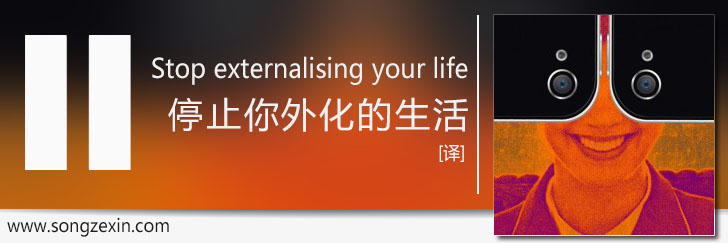 2013-05-27
2013-05-27
[译]
近伦敦Barbican博物馆举办了一个叫「雨室」的展览:一个房间,水从天花板各处洒下来,但进入里面的游客不会被淋湿,因为天花板上面会有传感器检测到人所站的位置,关掉他们正头顶的龙头。有趣而聪明的交互艺术,所以很受欢迎。这个展览开放的那会儿,我在Twitter上时常见到人们站在雨室中的照片,标题通常是「雨室@Barbican!」,当然,还有能证明他们确实到过那的位置信息。
这些看起来都长得差不多的照片让我开始想,关于这个体验他们真正想表达的是什么?显然,他们不是在同关注者分享什么奇珍异宝,也不是想要给出对这艺术作品的独特见解。说起来,他们只是觉得他们应该分享,不是那种与亲近的人分享快乐时光的那种分享,而是“告诉世界我在做一件事情”的那种分享。
我刚刚在新加坡呆了一个月。最初的几个星期,我总觉着得让家里那边的人知道我在干嘛,得多拍点照来证明,比如那些吃过的异国佳肴和看到的风景,如果不把它们数字化存储到Utah的某个数据中心,好像它们就会变得无关紧要。我发现我拍照纯粹是为了传达我在欢度美好时光,这样我在伦敦的朋友坐巴士回家的时候就可以在他们的手机上看到了。
想要同你关心的人分享体验是很自然的,如同传统的明信片所传达的意思,「要是你也在这就好了。」但我总觉得我们之所以要在社交网络上分享似乎却有着更诡异的原因。其实那根本不是分享,更像是「吹牛」。每次我们登陆Facebook或者Twitter 总能看见大家似乎都过的挺开心。这当然不是真实的生活,只是人们通常只会愿意贴出「好东西」,而避而不谈那些无聊、糟糕或是深沉的玩意。撇开浮夸不谈,这种偏好会使得我们下意识里感觉,好像其他人都过得比我们好! 我们试图通过精心修饰自己的生活,显得我们一直过的很开心,在做着重要的事情,以此来攀比。久而久之甚至形成了条件反射:每当有什么好事发生的时候,我们一定得广播给越多人知道越好。
网上有很多「Facebook会给你带来危害因为XXX」的文章,但我试图谈的是一种使用几乎任何网络服务都会产生的心态。这是这个时代的诅咒。我们拿着那些数码工具,把身边这样或那样的数据一股脑抓下来,然后实时传输到亲戚、朋友或是过去八年里认识的每一个人那里。我们对现实的感觉变的越来越弱:吃饭时,我们更关心Instgram哪个滤镜效果更好看,而不是面前的菜到底好不好吃。我们仿佛变成了好奇号火星探测车,在周边环境里转来转去,盲目的上传着数据,失去了探求意义的能力或愿望。最终,我们外化了我们整个生活。
想让世界知道你在做什么其实不是什么大错,但是当你机械的把你的生活张贴到网上时,你变得不再像是一个活生生的人,而更像一个棱镜,把周遭的光影反射到「云端」,同其他人的光影放在一起。你变成了操作手机的手指。
需要记住的是,当你把体验分享到网上时,它们并没有变得更好;相反,你会更容易受到干扰,因为你把更多的精力花在怎样润色它们,以给他人更好的印象。你对于某件事物的体验可能与其他人的相似,但它更应该是独特而不可复制的。所以,学着内化你的体验。写点超过140个字符的文章描述你的体验(甚至用真实的纸笔)。画一幅画描绘你的体验。跟你的朋友面对面谈论你的体验,说说它给你带来的感觉。
当你不再用社交网络上关注你的人的视角来看待事物时,这些体验才真正变成你自己的。你解脱了自己,不再有不必要的负担,总想着让别人知道你在干什么。你可以让你的体验变得更有意义,因为是你本人在那里,是你看到了那些画面,听到了那些声音,闻到了那些气味,而不是因为透过手机里半英寸不到的镜头拍下了照片。
[原文]
Recently the Barbican museum in London held an exhibition called the Rain Room. It was an installation in which water poured from the ceiling, but sensors detected where people were standing and would turn off the taps above their heads so they didn’t get wet. It was a clever and engaging piece of interactive art and was immensely popular. During the time this installation was open, my Twitter stream was filled with photos of people standing in the Rain Room, accompanied by the caption ‘Rain Room @ The Barbican!’ and a location attachment to prove that they were indeed in the Rain Room.
This stream of homogenous photos got me thinking. What were people actually saying by Tweeting about their visit? They certainly weren’t sharing some hidden gem with their followers, nor were they bringing a unique interpretation of the artwork to the table. Ultimately, all they were doing was fulfilling the obligation that we have to Share. Not sharing in the sense of treasuring a moment with people close to us, but Sharing in the sense of ‘notify the world that I am doing a thing’.
I’ve just spent a month in Singapore. Throughout the first couple of weeks I felt a constant nagging that everyone back home had to know what was going on. I felt like I should be photographing everything I did as proof; that all the exotic food I was eating and the sights I was seeing wouldn’t really matter if they weren’t digitally logged in a data centre somewhere in Utah. I found myself taking pictures purely to convey what an amazing time I was having, so that my friends would see it on their smartphones whilst riding the bus back in London and be impressed.
It’s natural to want to share experiences with the people you care about. After all, the classic postcard greeting is ‘Wish you were here’. But I think our reasons for sharing experiences on social media are more cynical than that. It’s not sharing, it’s bragging. When we log in to Facebook or Twitter we see an infinitely updating stream of people enjoying themselves. It’s not real life, of course, because people overwhelmingly post about the good things whereas all the crappy, dull or deep stuff doesn’t get mentioned. But despite this obvious superficiality, it subconsciously makes us feel like everyone is having a better time than us. We try to compete by curating our own life experiences to make it look like we’re also having non-stop fun and doing important things. It breeds in us a Pavlovian response that means every time something good is happening to us we must broadcast it to as many people as possible.
There are plenty of ‘Facebook is bad for you because X’ posts, but I’m talking about a mindset that goes beyond any single web service. This is the curse of our age. We walk around with the tools to capture extensive data about our surroundings and transmit them in real-time to the bedrooms and pockets of friends, family and every acquaintance we’ve made in the past eight years. We end up with a diminished perception of reality because we’re more concerned about choosing a good Instagram filter for our meal than we are about how it tastes. We become Martian rovers, trundling around our environment, uploading data without the ability or desire to make any sense of it. Ultimately, we end up externalising our entire lives.
I don’t think that it’s inherently wrong to want to keep the world updated about what you’re doing. But when you go through life robotically posting about everything you do, you’re not a human being. You’re just a prism that takes bits of light and sound and channels them into The Cloud, to be stored with all the other bits of light and sound from everyone else. You become nothing more than the thumb operating your smartphone.
The key thing to remember is that you are not enriching your experiences by sharing them online; you’re detracting from them because all your efforts are focussed on making them look attractive to other people. Your experience of something, even if similar to the experience of many others, is unique and cannot be reproduced within the constraints of social media. So internalise that experience instead. Think about it. Go home and think about it some more. Write about it in more than 140 characters; on paper even. Paint a picture of it. Talk about it face to face with your friends. Talk about how it made you feel.
Once you stop seeing things through the eyes of the people following you on Twitter or Facebook or Instagram you become able to make experiences your own. You can relieve yourself of the burden of having to make everyone aware of what you’re doing at all times. You can make your experiences significant because you were there and you saw the sights and smelled the smells and heard the sounds, not because you snapped a photo of it through a half-inch camera lens built into your phone.
原文地址:http://jshakespeare.com/stop-externalising-your